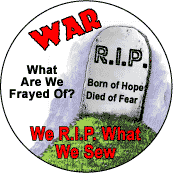Be very frayed
Terrorism comes
From know where
Deep in the recesses
Of kindergarten bullying
Capital vocations
And martial lawlessness
Awe rapped up in won’s highest I deal
Those unspeakable prophets
In security
Detained indefinitely
Until hell frees us
Ever more reckoning
The other
Who war like
A mirror reflection
Knot of won self
But a puerile of grate wisdom
Selling all
Having bought it
With bigger barns
Taking life easy
This is my third published poem in a row on the theme of terrorism. You might say that I’m on a role in combating hypocritical fearmongering and conveniently overlooked accountability for vicious cycles of violence plaguing our whirled.  The prison of necessary evil is the bedrock upon which militarism is built. Of coarse, the jailbirds sing oft-repeated jingles of in-group unmistakable righteousness and the presumptively incomprehensible evil descending upon their already worrisome state. Fear is the only effective tool to fuel such jingoism and blind obedience to longstanding systems of oppression that conveniently turn justice into just us. That such fear can swirl in a sea of privilege is the fundamental disconnect that makes chronic injustice passable. Pointing out profound privilege and hyperbolic fears is heretical to the god of war. Not surprisingly, the god of war, Nike, is well characterized by the slogan, “Just do it!” which has a singular ring to rule all idioms. The inescapable prison of the permanent war on terrorism, with violence begetting violence begetting violence, based on the damnable logic of necessary evil, can only end with the absurdity “When hell frees us.” As Dante, in Inferno, signaled in his sign at the entrance of hell, “Abandon all hope, you who enter here.” How can we free ourselves from this parent prison of necessary evil that infantilizes our moral development, and stultifies children of God into spawn of the devil? How burden some is at the crux of this issue. What must we sacrifice? What must we cede? What must we feed?
The prison of necessary evil is the bedrock upon which militarism is built. Of coarse, the jailbirds sing oft-repeated jingles of in-group unmistakable righteousness and the presumptively incomprehensible evil descending upon their already worrisome state. Fear is the only effective tool to fuel such jingoism and blind obedience to longstanding systems of oppression that conveniently turn justice into just us. That such fear can swirl in a sea of privilege is the fundamental disconnect that makes chronic injustice passable. Pointing out profound privilege and hyperbolic fears is heretical to the god of war. Not surprisingly, the god of war, Nike, is well characterized by the slogan, “Just do it!” which has a singular ring to rule all idioms. The inescapable prison of the permanent war on terrorism, with violence begetting violence begetting violence, based on the damnable logic of necessary evil, can only end with the absurdity “When hell frees us.” As Dante, in Inferno, signaled in his sign at the entrance of hell, “Abandon all hope, you who enter here.” How can we free ourselves from this parent prison of necessary evil that infantilizes our moral development, and stultifies children of God into spawn of the devil? How burden some is at the crux of this issue. What must we sacrifice? What must we cede? What must we feed?
Bringing about peace and justice to the whirled is formidable work that takes a lot of time to cede itself and seed itself. In the mean time, there is a need to endure sum violence, as an existing reality with its own inertia. This brakes the cycle of violence. As well, we need to address the causes and grievances powering violence and dis-empowering nonviolence. This is required to prevent violence from seeding itself, and to feed nonviolent alternatives. This breaks the cycle of violence. This is not easy.
That violence can save us is as owed as life and death itself. The myth of redemptive violence is deep-seated in human history and culture. Walter Wink put it best: “The myth of redemptive violence is the simplest, laziest, most exciting, uncomplicated, irrational, and primitive depiction of evil the world has even known.”
This poem ends with a tip of the hat to two of Jesus’ parables. First, the parable of the rich fool (Luke 12:13-21) who has so much that he tears down his barns to build even bigger barns, only to have his “eat, drink, and be merry” life on earth end precipitously. Next, the parable of the hidden treasure, a pearl of great value, for which we will trade all we possess for it (Mathew 13:44-45). That pearl of great price is peace. May each of us be barnstormers for peace, not barn-storers fore violence.
Our lives can begin the long weigh to peace when we get beyond the myth of redemptive violence. May we each critically examine our own privilege and personal hurts that prompt us to take the low road of violence. May we each meditate and daily work on awe the things that make for peace and a whole, new world.


